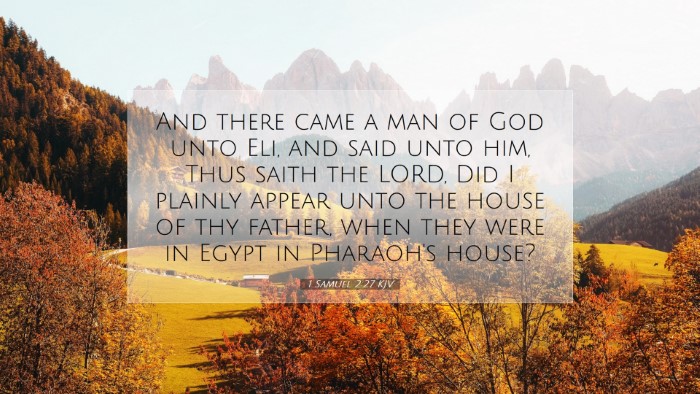Commentary on 1 Samuel 2:27
Bible Verse: 1 Samuel 2:27 - "And there came a man of God unto Eli, and said unto him, Thus saith the Lord, Did I plainly appear unto the house of thy father, when they were in Egypt in Pharaoh's house?"
Introduction
The verse 1 Samuel 2:27 serves as a critical juncture in the narrative surrounding the priesthood of Eli and the moral and spiritual decline of Israel during this period. This commentary synthesizes insights from Matthew Henry, Albert Barnes, and Adam Clarke, offering an in-depth look at its implications for pastors, students, theologians, and Bible scholars.
Contextual Background
To fully appreciate this verse, it is essential to understand its placement within the broader narrative of 1 Samuel. This book marks the transition of Israel from a tribal confederation to a monarchy. Eli, a priest and judge, represents a system that has fallen into disrepair, both morally and spiritually. Samuel's rise as a prophet is preceded by this prophetic warning to Eli, emphasizing the theme of divine judgment.
Historical Context
-
The Role of Eli: Eli served as a judge and priest during a time of spiritual apathy among the people. His household was marked by scandal and neglect of proper priestly conduct.
-
The Man of God: This mysterious figure represents divine authority, coming to Eli with a message of rebuke. His presence signifies the seriousness of the charge against Eli and serves as a divine invocation of covenant loyalty.
Interpretation
Within this verse, the primary focus is on God's interaction with Eli's family. The phrase "Did I plainly appear unto the house of thy father" signifies God's previous revelations and interventions on behalf of Eli's ancestors, highlighting a historical relationship that should inspire fidelity and reverence.
Theological Insights
-
Divine Revelation: God's inquiry reflects His initiative in revealing Himself to His chosen people. As noted by Matt Henry, it emphasizes the responsibility of leaders to uphold divine standards.
-
Covenant Responsibility: Albert Barnes notes that with privilege comes responsibility; Eli's lineage was favored, yet his failure to act justly incurs serious repercussions.
-
Judgment and Grace: Adam Clarke emphasizes that this verse exemplifies God's enduring grace, as He repeatedly seeks to guide and correct His people before enacting judgment.
Application
For modern readers—especially leaders within the church—1 Samuel 2:27 serves as a poignant reminder of the serious weight of responsibility that comes with spiritual oversight. Pastors and church leaders are called to lead with integrity and to remain faithful to God's covenant.
Lessons for Church Leadership
-
Awareness of God’s Presence: Leaders must recognize God’s ongoing activity and presence in their ministry. Just as God appeared to Eli, He continues to be active in guiding and correcting His people.
-
Responsibility and Accountability: The narrative signifies the need for accountability within the leadership structure of the church. Those in positions of authority will be held to a higher standard.
-
Heeding Divine Warnings: The call to introspection and repentance is crucial. When leaders receive warnings (like Eli did), they must respond with humility and seek restoration.
Conclusion
1 Samuel 2:27 is rich with theological implications and lessons for leadership. It serves as both a historical marker and a spiritual admonition. As we reflect on this passage, let us be reminded of the importance of fidelity to God’s calling and the need for leaders to act righteously in the face of divine accountability. Through the insights from the commentaries of Matthew Henry, Albert Barnes, and Adam Clarke, we gain a deeper understanding of God’s character, His expectations, and the path of faithfulness that leads to His blessing.


